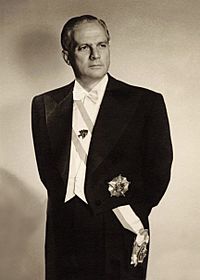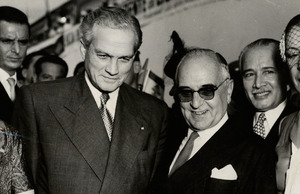Camille Chamoun facts for kids
Quick facts for kids
Camille Chamoun
OM, ONC
|
|
|---|---|
| كميل شمعون | |

Camille Chamoun's Presidential portrait, 1952.
|
|
| 2nd President of Lebanon | |
| In office 23 September 1952 – 22 September 1958 |
|
| Prime Minister | Abdallah El-Yafi Khaled Chehab Saeb Salam Abdallah El-Yafi Sami as-Solh Rashid Karami Abdallah El-Yafi Sami as-Solh Khalil al-Hibri (Acting) |
| Preceded by | Bechara El Khoury |
| Succeeded by | Fuad Chehab |
| Member of the Lebanese Parliament | |
| In office 1934–1952 |
|
| In office 1960–1964 |
|
| In office 1968–1987 |
|
| Leader of National Liberal Party | |
| In office 10 September 1958 – 1985 |
|
| Preceded by | Post established |
| Succeeded by | Dany Chamoun |
| Personal details | |
| Born | 3 April 1900 Deir el Qamar, Ottoman Empire |
| Died | 7 August 1987 (aged 87) Beirut, Lebanon |
| Political party | Constitutional Bloc (1934–1958) (1958–1987) |
| Spouse |
Zelpha Tabet
(m. 1930; died 1971) |
| Children | Dany, Dory |
| Alma mater | Saint Joseph University |
| Religion | Eastern Catholic Church |
Camille Nimr Chamoun (born April 3, 1900 – died August 7, 1987) was an important Lebanese politician. He served as the President of Lebanon from 1952 to 1958. He was also one of the main Christian leaders in Lebanon during much of the Lebanese Civil War (1975–1990).
Contents
Early Life and Education
Camille Nimr Chamoun was born in Deir al-Qamar, a town in Lebanon, on April 3, 1900. He came from a well-known Maronite family. He studied law and earned a degree from Saint Joseph University.
Becoming a Leader
Chamoun was first elected to the Lebanese parliament in 1934. He was re-elected several times after that. He strongly supported Lebanon becoming independent from France.
In November 1943, he was arrested and held in a castle with other future leaders. This was because they were fighting for independence. Huge public protests led to their release just eleven days later. This day, November 22, is now celebrated as Lebanese Independence Day.
After independence, Chamoun served as an ambassador for Lebanon. He represented his country in the United Kingdom and at the United Nations. He also worked as the finance minister for a short time.
President of Lebanon
In 1952, the president at the time, Bechara El Khoury, had to resign. This happened because of accusations of corruption. Camille Chamoun was then elected to take his place as president.
During Chamoun's time as president, Lebanon's economy grew a lot. There was a boom in building, banking, and tourism. He introduced new laws to help businesses and protect banking privacy.
The 1958 Crisis
Near the end of his presidency, Chamoun wanted to be president for another term. However, this was against the constitution. Groups who supported Pan-Arabism and Gamal Abdel Nasser tried to overthrow his government. These groups had a lot of support from the Muslim community in Lebanon.
To deal with the unrest, Chamoun asked the United States for help. American Marines then landed in Beirut. There were many fights, especially in Beirut. The revolt was eventually stopped. To calm things down, General Fuad Chehab was chosen to become the next president. He was a Christian but was popular with Muslims.
Starting a New Party
After his presidency ended, Chamoun started a new political group called the National Liberal Party. He was elected to parliament again in 1960. He was re-elected in 1968 and 1972. The 1972 election was the last parliamentary election in Lebanon during his lifetime.
After the 1968 election, his party became the largest single party in parliament. It was special because it had members from all of Lebanon's main religious groups.
Role in the Civil War

In the 1970s and 1980s, Lebanon faced a long and difficult period called the Lebanese Civil War. During this time, Chamoun served in different government roles, including interior minister. His party had its own armed group called the "Tigers."
Chamoun helped create the Lebanese Front. This was a group of mostly Christian politicians and parties. Their combined armed forces were known as the Lebanese Forces. Chamoun was the leader of the Lebanese Front from 1976 to 1978. He also served as defense minister in 1976.
At first, Chamoun worked with Syria and even invited the Syrian Army to help. Later, he became against Syria's presence in Lebanon. There were attempts on his life during this period, but he survived.
In 1980, his party's "Tigers" militia was attacked by a rival Christian group. After Israel entered Lebanon in 1982, Chamoun decided to work with Israel. He saw this as a way to oppose what he believed was Syria's control over Lebanon.
Later Life and Legacy
Camille Chamoun married Zelpha Tabet in 1930. They had two sons, Dany and Dory. Both of his sons also became politicians.
In 1984, Chamoun joined the National Unity government as deputy prime minister. He held this position until he passed away. Camille Chamoun died on August 7, 1987, at the age of 87, from a heart attack. He is remembered as one of Lebanon's key Christian nationalist leaders. He was one of the last important politicians from the generation before the civil war.
See also
 In Spanish: Camille Chamoun para niños
In Spanish: Camille Chamoun para niños
 | Bessie Coleman |
 | Spann Watson |
 | Jill E. Brown |
 | Sherman W. White |

